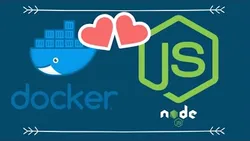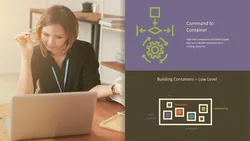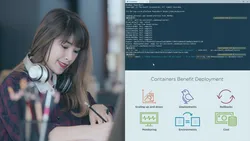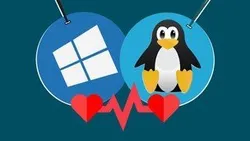
Spin up a lightweight Nodejs docker 
This course provides an introduction to Docker, Apache Kafka, Database Sharding, Connection Pooling in PostgresSQL with NodeJS, and RabbitMQ. It covers topics such as spinning up a lightweight Nodejs docker container, understanding Apache Kafka, sharding databases with Postgres examples, and optimizing performance with connection pooling. Participants will gain the skills to build and deploy applications with Docker. ▼
ADVERTISEMENT
Course Feature
![]() Cost:
Cost:
Free
![]() Provider:
Provider:
Youtube
![]() Certificate:
Certificate:
Paid Certification
![]() Language:
Language:
English
![]() Start Date:
Start Date:
On-Demand
Course Overview
❗The content presented here is sourced directly from Youtube platform. For comprehensive course details, including enrollment information, simply click on the 'Go to class' link on our website.
Updated in [February 21st, 2023]
What does this course tell?
(Please note that the following overview content is from the original platform)
Spin up a lightweight Nodejs docker container running your application.
Apache Kafka Crash Course.
Database Sharding Crash Course (with Postgres examples).
Connection Pooling in PostgresSQL with NodeJS (Performance Numbers).
RabbitMQ Crash Course.
Javascript and Mongodb Tutorial with Mongodb NodeJS Driver.
Redis In-memory Database Crash Course.
Spinning MongoDB, MongoShell and Mongo GUI with Docker.
Spin up a lightweight Nodejs docker container running your application.
Spinning MongoDB, MongoShell and Mongo GUI with Docker.
Spinning MySQL Database with Docker.
Spinning multiple Postgres instances and PGAdmin with Docker.
The evolution from virtual machines to containers.
Docker Volumes Explained (PostgreSQL example).
Step by Step Basic Microservices System (3 NodeJS + 1 Load Balancer containers) with Docker Compose.
Spin up an Nginx Docker Container as a Load Balancer.
Portainer - Lightweight Management UI for Docker.
Portainer - Lightweight Management UI for Docker.
Burned by Docker and it was my fault.
We consider the value of this course from multiple aspects, and finally summarize it for you from three aspects: personal skills, career development, and further study:
(Kindly be aware that our content is optimized by AI tools while also undergoing moderation carefully from our editorial staff.)
Learners can learn a variety of topics from this online course, including spinning up lightweight Nodejs docker containers, Apache Kafka, database sharding, connection pooling in PostgresSQL with NodeJS, RabbitMQ, Javascript and Mongodb Tutorial with Mongodb NodeJS Driver, Redis In-memory Database, spinning MongoDB, MongoShell and Mongo GUI with Docker, spinning MySQL Database with Docker, spinning multiple Postgres instances and PGAdmin with Docker, the evolution from virtual machines to containers, Docker Volumes Explained (PostgreSQL example), step by step basic microservices system (3 NodeJS + 1 Load Balancer containers) with Docker Compose, spinning up an Nginx Docker Container as a Load Balancer, and Portainer - Lightweight Management UI for Docker.
Learners can unlock the exciting world of learning by exploring the fundamentals of spinning up lightweight Nodejs docker containers, understanding the basics of Apache Kafka, database sharding, and connection pooling in PostgresSQL with NodeJS, and learning how to use RabbitMQ, Javascript and Mongodb Tutorial with Mongodb NodeJS Driver, Redis In-memory Database, spinning MongoDB, MongoShell and Mongo GUI with Docker, spinning MySQL Database with Docker, spinning multiple Postgres instances and PGAdmin with Docker, the evolution from virtual machines to containers, Docker Volumes Explained (PostgreSQL example), step by step basic microservices system (3 NodeJS + 1 Load Balancer containers) with Docker Compose, spinning up an Nginx Docker Container as a Load Balancer, and Portainer - Lightweight Management UI for Docker.
By taking this course, learners can gain a comprehensive understanding of the fundamentals of spinning up lightweight Nodejs docker containers, Apache Kafka, database sharding, connection pooling in PostgresSQL with NodeJS, RabbitMQ, Javascript and Mongodb Tutorial with Mongodb NodeJS Driver, Redis In-memory Database, spinning MongoDB, MongoShell and Mongo GUI with Docker, spinning MySQL Database with Docker, spinning multiple Postgres instances and PGAdmin with Docker, the evolution from virtual machines to containers, Docker Volumes Explained (PostgreSQL example), step by step basic microservices system (3 NodeJS + 1 Load Balancer containers) with Docker Compose, spinning up an Nginx Docker Container as a Load Balancer, and Portainer - Lightweight Management UI for Docker. Learners can also gain valuable insights into the development direction of these topics and draw conclusions from their learning experience.
[Applications]
After taking this course, participants can apply their knowledge by spinning up lightweight Nodejs docker containers running their applications, setting up Apache Kafka, database sharding with Postgres examples, connection pooling in PostgresSQL with NodeJS, RabbitMQ, Javascript and Mongodb Tutorial with Mongodb NodeJS Driver, Redis In-memory Database, spinning MongoDB, MongoShell and Mongo GUI with Docker, spinning MySQL Database with Docker, spinning multiple Postgres instances and PGAdmin with Docker, understanding the evolution from virtual machines to containers, understanding Docker Volumes with PostgreSQL example, setting up a basic microservices system with 3 NodeJS + 1 Load Balancer containers with Docker Compose, spinning up an Nginx Docker Container as a Load Balancer, and using Portainer as a lightweight management UI for Docker. Additionally, participants can learn from the instructor's experience of being burned by Docker and the mistakes that were made.
[Career Paths]
1. Node.js Developer: Node.js developers are responsible for developing and maintaining web applications using Node.js. They must have a strong understanding of JavaScript, HTML, and CSS, as well as experience with databases such as MongoDB and PostgreSQL. Node.js developers must also be familiar with the latest trends in web development, such as microservices, containerization, and serverless computing.
2. Database Administrator: Database administrators are responsible for the design, implementation, and maintenance of databases. They must have a strong understanding of database technologies such as MongoDB, PostgreSQL, and MySQL, as well as experience with database sharding, connection pooling, and performance tuning. Database administrators must also be familiar with the latest trends in database technologies, such as cloud-based databases and NoSQL databases.
3. DevOps Engineer: DevOps engineers are responsible for automating the deployment and management of applications and services. They must have a strong understanding of containerization technologies such as Docker and Kubernetes, as well as experience with cloud-based services such as AWS and Azure. DevOps engineers must also be familiar with the latest trends in DevOps, such as continuous integration and continuous delivery.
4. Cloud Architect: Cloud architects are responsible for designing and implementing cloud-based solutions. They must have a strong understanding of cloud-based services such as AWS and Azure, as well as experience with containerization technologies such as Docker and Kubernetes. Cloud architects must also be familiar with the latest trends in cloud computing, such as serverless computing and microservices.
Course Provider

Provider Youtube's Stats at AZClass
Over 100+ Best Educational YouTube Channels in 2023.
Best educational YouTube channels for college students, including Crash Course, Khan Academy, etc.
AZ Class hope that this free Youtube course can help your Docker skills no matter in career or in further education. Even if you are only slightly interested, you can take Spin up a lightweight Nodejs docker course with confidence!
Discussion and Reviews
0.0 (Based on 0 reviews)
Explore Similar Online Courses

Jewelry Design with Laser Cutting

How to Build a Shopify Store

Python for Informatics: Exploring Information

Social Network Analysis

Introduction to Systematic Review and Meta-Analysis

The Analytics Edge

DCO042 - Python For Informatics

Causal Diagrams: Draw Your Assumptions Before Your Conclusions

Whole genome sequencing of bacterial genomes - tools and applications

Managing Docker on Linux Servers

Fundamentals of Docker and Kubernetes for NET Developers


Start your review of Spin up a lightweight Nodejs docker